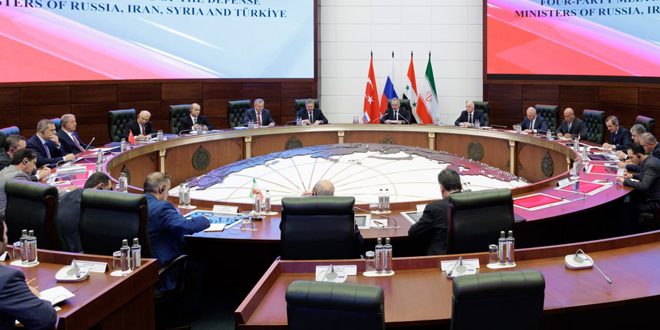Damascus condemns EU sanction listings
Damascus is upset with the latest wave of EU sanction listings. An unnamed official source at the foreign Ministry said in a statement to SANA Tuesday that his government condemns “in the strongest terms” the new decision of the European Union to boost the unilateral coercive measures against the country, in the framework of its hostile policy in the war on Syria.
“The European Union repeats its lies when it claims that the sanctions imposed on Syria do not impede delivery of humanitarian aid or access to foodstuffs and medical equipment,” the official said.
The source added “the EU policies pose serious threat to the lives and livelihood of Syrians and negatively reflect on the country’s economy, and the exceptions that the European Union claims about are only for media propaganda and to hide the truth of its policies towards Syria.
Turkey, Russia, Iran, Syria hold “constructive talks”
The defense ministers and intelligence chiefs of Iran, Russia, Syria and Turkey held talks on Tuesday that Ankara and Moscow described as constructive, as part of efforts to rebuild Turkey-Syria ties after years of animosity during the Syrian war.
No details have been publicized of the meeting so far.
SANA issued a brief statement, in which it said, “The Syrian, Russian, Iranian, and Turkish defense ministers held quadripartite meeting on Tuesday to discuss withdrawal of Turkish forces from Syrian territory and implementation of the agreement on the M4 International Highway, the Defense Ministry said.
“The Ministry had announced on 28th of the last December in a statement that a meeting was held among Syrian Defense Minister, Director of Syrian General Intelligence Administration with their counterparts, the Turkish Defense Minister and Turkish Head of Intelligence Apparatus in the Russian capital of Moscow with the participation of the Russian side. They discussed a number of issues, and the meeting was positive.”
But Reuters reported that the ministers and intelligence service chiefs discussed strengthening security in Syria and the normalization of ties between Ankara and Damascus, the Turkish and Russian defense ministries said in separate statements.
All four countries reaffirmed their desire to preserve Syria’s territorial integrity and the need to intensify efforts for the speedy return of Syrian refugees to their country, the statements said.
The Syrian and Turkish defense ministers previously held talks in Moscow in December, marking the highest-level encounter between the two countries since the war began.
Turkey’s foreign minister last week said that a meeting of foreign ministers of the four countries that would build on the December talks may take place in early May, but he later said it was postponed because the parties could not agree on an exact date.
In the meantime, Foreign Minister Mevlüt Çavuşoğlu reiterated plan to stay in Syria until stability ensured.
Terminating counterterrorism operations and withdrawing from northern Iraq and Syria would mean terrorists could amass at Turkey’s borders and threaten its perpetuity, according to Çavuşoğlu.
“Turkey’s exit from the region would create a power vacuum that terrorists would rush to fill,” Çavuşoğlu said in a televised interview on Monday evening and stressed that Ankara will not do so until stability is facilitated in its war-torn neighbor.
Çavuşoğlu argued that abandoning the 30-kilometer-deep (18-mile) security strip Turkish troops have been working to establish along the Syrian border would see “terrorists piling up at our borders and God forbid, something would blow up in Turkey every other day.”
Emphasizing that Turkey’s national security was “more important than anything,” Çavuşoğlu said, “We’re paying the price every day to keep our land safe, not because we’re enjoying it or we covet Syrian territory.”
He explained that Ankara would consider exiting Syria once “total security” and civil peace are established in the region, but it “is currently impossible as it would spark serious threats.”
Scandal of Syria’s stolen homes: fraudsters use courts to legitimize thefts from refugees
The UK Guardian published on Tuesday a long report on how Assad’s militias and shabiha are stealing refugees houses in Syria. Refugees fleeing Syria’s civil war are finding that their homes have been stolen by corrupt networks profiting from the conflict by stripping property from those displaced. Forging sales documents and forcing them through the courts without the owners’ knowledge, the networks can have up to 50 members, from lawyers and judges to military officials. In the absence of centralised court records, there is no data on the scale of property thefts in Syria, but one lawyer has discovered 125 cases of stolen homes in Damascus alone in the first half of 2022.
Syria says it suffers from exploitation of UN system by western countries
Syria’s permanent representative to the UN, Bassam Sabbagh, has called for the UN to review its working mechanisms and prevent their exploitation by some Western countries in the service of their destructive policies and agendas, SANA reported.
Speaking at a session of the UN Security Council, Sabbagh accused some countries of exploiting the UN system to serve their hostile and interventionist policies in Syria’s affairs. He pointed out that Syria has fallen victim to the loss of true pluralism and that its national wealth and resources are being plundered by foreign forces.
Sabbagh stressed that preserving true pluralism requires reforming current structures, such as expanding the Security Council to reflect the new reality of international relations, as well as reforming international financial institutions.
He added that the essential elements to advance the work of the UN are to promote the values of peace, settle disputes by peaceful means, ensure equality in sovereignty between all member states, and promote economic development and cooperation. Sabbagh concluded his speech by noting that the UN multilateral system has faced many challenges in dealing with a series of political, economic and social crises over the past two decades, and he called for more effective action to tackle the ongoing issues.


